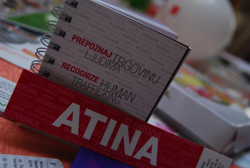Hotline: +381 61 63 84 071
Serbians are increasingly becoming victims of Human Trafficking

|
Victims of human trafficking in the last three years have mostly been Serbian citizens, more than 50 percent of whom are children, and due to the economic crisis it seems that human trafficking even "blossomed", says Jelena Hrnjak of the Citizens’ Association for Combating Trafficking in Human Beings "Atina".
In the interview she gave to Tanjug, she said that in recent years, since the official record keeping of the number of identified victims of human trafficking began in 2004, the situation in this area changed significantly, which is apparent in the fact that most often the victims are Serbian citizens. |
||
|
- Previously, the identified victims were mostly women and girls from the former Soviet republics, but now the trend has changed. The number of foreign nationals who were identified as victims of human trafficking in our country does not exceed five percent. Human trafficking does not only happen to some other people in some other countries, it is happening right here and to our citizens - said Hrnjak.
According to her, the poor economic situation is one of the reasons for the increase in the number of victims of human trafficking, whereby she particularly indicated the fact that more than 50 percent of identified victims are children, and that number is growing each year. - This is a very alarming information, considering that, in our experience, the state is not prepared to deal with this issue properly. There are no adequate programs for those children to be taken care of in the right way, there is no shelter for children victims of human trafficking - said Hrnjak. She added that last year there were 70 identified victims of human trafficking, and nine potential victims, which is approximately the same as in previous years, but that it's an indication there is no way that the state can identify a larger number of victims of human trafficking with its current mechanisms. Hrnjak assessed that the regulatory framework, governing the crime of human trafficking in Serbia, is not fundamentally bad, but that law enforcement is problematic, since the trials are mostly ending with minimal penalties. - The largest number of judgements rendered for the crime of human trafficking actually ends with the court pronouncing minimum sentence, and you realize afterwards, while working with victims ,that those sentences are not nearly proportional to the amount of damage caused to a particular person - said Hrnjak. She added that, due to instance verdicts and retrials, individual victims go through the torture of meeting their "trafficker" again in court, adding that delay in the proceedings hampers the inclusion of victims in society. - One of the main problems is that this criminal offence is not recognized sufficiently. We have a large number of cases where it happens that, because the prosecutor did not recognize it as a crime of human trafficking, children who are sexually exploited do not get to be identified as victims, which is why they do not join the system of support and protection. This is something that the state should pay particular attention to - Hrnjak believes. According to her, the progress, when it comes to human trafficking, is in the fact that the victims of sexual exploitation are no longer the only ones identified, so now there is an increasing number of victims of labour exploitation, coercion to commit crime, forced marriage and other types of exploitation. The experience of “Atina’s” activists, as Hrnjak said, suggests that certain systems do not recognize the issue of human trafficking as their problem, placing it only in the criminal justice framework. She emphasized that the essence lies in the prevention of causes of human trafficking, and the reasons that bring people in a situation to become victims. As she explained, most victims do not even have basic education, which is why they are not competitive in the labour market, so they face discrimination and high unemployment rate, which is taking them back into the hands of traffickers. - We have an idea for the establishment of special program of economic empowerment of the victims of human trafficking, because we believe that is one of the key solutions for them to exit the situation they are in, and for their independence - said Hrnjak. This will, most likely, occur through the formation of social enterprises, she said, adding that the cooperation with the National Employment Service will strengthen, and that they will try to assist identified victims of human trafficking to complete primary education and to train for a particular type of craft, in order to be able to take care of themselves. She explained that "Atina", in cooperation with "Novi Sad’s Humanitarian Centre", with the support of the Serbian Government’s Social Inclusion and Poverty Reduction Unit, implements the idea to strengthen the capacity of local self-government in the fight against human trafficking. The plan is to form local support networks in Novi Sad, Subotica, Sremska Mitrovica, Kraljevo, Kragujevac, Nis and Vranje, composed of prosecutors, judges, competent social work centres, police departments and branches of the National Employment Service, that will, as she says, be able to directly assist victims of trafficking. - The gist of this story is not to simply provide accommodation to the victim, but to provide space and time to those people who are identified as victims, so they can, even after their personal stabilization, have a place to go to, and have a support system that will in some way be responsive (responsible) to them, and respond to what they really need, not only fill a form, but deal with the essence of their life and problems - concluded Hrnjak - education and training for a specific type of craft and work in order to be able to take care of themselves. Source: 24sata |
||












 FACEBOOK
FACEBOOK TWITTER
TWITTER YOUTUBE
YOUTUBE